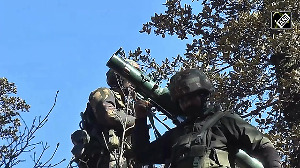The world has always been a dangerous place. From the black plague to avian flu, Attila the Hun to Osama bin-Laden, Mount Vesuvius to the Indian Ocean tsunami--and let's not even mention biological or nuclear warfare--people and cultures are eternally prone to natural disaster, social upheaval and just plain killing each other.
Some places have it worse than others.
Once the fields of Europe, now filled with prospering economies and high-speed autoroutes, were the abattoirs of the world. Armies marched and counter-marched over them, raping and pillaging as they went. Virginia's Shenandoah Valley, one of the U.S.'s great agricultural breadbaskets, was the site of many battles during the Civil War.
Slideshows:
World's most dangerous destinations 2006
Where we want to go in 2006
Best bets for business trips
The islands of Polynesia, synonymous with paradise in the minds of many, have endured tribal warfare, invasion and cannibalism for centuries. All these places are now, thankfully, relatively peaceful but the fact of the matter is that there is scarcely an acre of land on the planet over which someone has not fought or where blood has not been shed.
Today's headlines, of course, constantly remind us of where the most blood is currently being shed. Iraq is a tragically obvious example. From Afghanistan to Zimbabwe, there are nations and peoples being ground under by oppression, terrorism, poverty and death. These are places where the rule of law is arbitrary, education is an after-thought and life is cheap.
However, none of that stops the employees of multinational corporations and nongovernmental organisations. They conduct business regularly in the world's most dangerous countries. Of course, they do their research first, hiring risk-management consultancies to advise and train them before they travel.
"Our job is to arm people with the most up-to-date, relevant intelligence on a city or region," says John Briley, the senior managing editor at iJet Intelligent Risk Systems, an Annapolis, Md.-based risk-management firm. "Risk managers and corporate security directors want peace of mind that their employees and assets will be as secure as they can be."
Angela Aggeler, a spokesperson for the Bureau of Consular Affairs at the US State Department, agrees that information is everything. "The critical thing is that no two situations are alike. Depending on where you are in Africa, the Middle East or Asia, laws and medical care are very different. We strive to make sure that travelers have the same information we as diplomats have." In many parts of the world, Aggeler continues, "Americans and Western interests are targets, and Americans should be aware of that."
The State Department issues a Travel Warning for any country it deems particularly volatile, and recommends that anyone traveling overseas, whether for business or pleasure, register with them first. Since online registration debuted in July 2004, almost 400,000 people have signed up, making an electronic copy of their itinerary accessible to officials in case of an emergency abroad. It makes sense. When cities like London and Paris experience subway bombings and violent riots, travelers may wonder if anywhere is truly safe anymore.
Slideshow:
World's most expensive resorts
Best and worst international airports
World's sexiest islands
"We've seen a rash of terrorist incidents at resorts, places that are traditionally soft targets and vacation destinations," says Dave Johnson, director of training for The Steele Foundation, a California-based risk-management company. Johnson teaches his corporate clients to search a vehicle for an improvised explosive device (look for exposed wires and an alligator clip) or to practice evasive driving maneuvers in the event of a kidnapping scenario (back up the car, drive through the situation, or "ram," which is pretty much what it sounds like). "A definite awareness of security issues is developing across the board, and this has allowed security budgets to grow," he says.
Johnson won't reveal the price lists for his classes, which range from one-hour seminars to week-long workshops, but one thing is clear. In an increasingly volatile geopolitical climate, with security budgets growing, it's profitable to be on the consulting side of dangerous travel.
"We've been busy," concurs Bill Mathews, a former Navy SEAL and executive vice president at Blackwater, a North Carolina-based firm that offers self-defense, survival and firearms training for the U.S. government and has about 2,000 personnel stationed throughout the world, including Afghanistan and Iraq. Blackwater won't release financial data or service fees, but Mathews adds that "revenue has grown significantly since the company was founded in 1997."
At iJet, intelligence packages start at $5,000, and add-ons such as traveler tracking and response capabilities can cost much more. But clients, like Archer Daniels Midland, Prudential Financial and Booz Allen Hamilton, know it's a small fee in the face of a potentially huge payoff.
"If you look at the sectors our clients are in, it's energy, banking, mining, natural resources and pharmaceuticals," Briley says. "They are sectors that traditionally work in the riskiest fringes of the earth. That's where there's the potential for new medicines, natural resources, or major gas fields"--all of which come with major profit. So while traveling there may be dangerous, it certainly has an upside.
Forbes.com has compiled our annual list of the Most Dangerous Travel Destinations again this year. To determine which countries were the most dangerous, we asked iJet and Control Risks, a London-based risk consultancy, to provide us with their watch lists of high-risk countries. IJet ranks countries across six categories, including crime and security services, and assigns each country a rating of one to five (five is severe). Control Risks ranks countries across four categories, including political and terrorist risk, and rates each country on a five-point scale, from Insignificant through Extreme.
We cross-referenced the resulting 14 countries with the Travel Warnings published by the State Department as part of its Consular Information Program. If you plan to visit any of them, we hope you get plenty of danger pay, are equipped with the latest body armor and have an excellent life insurance policy.





